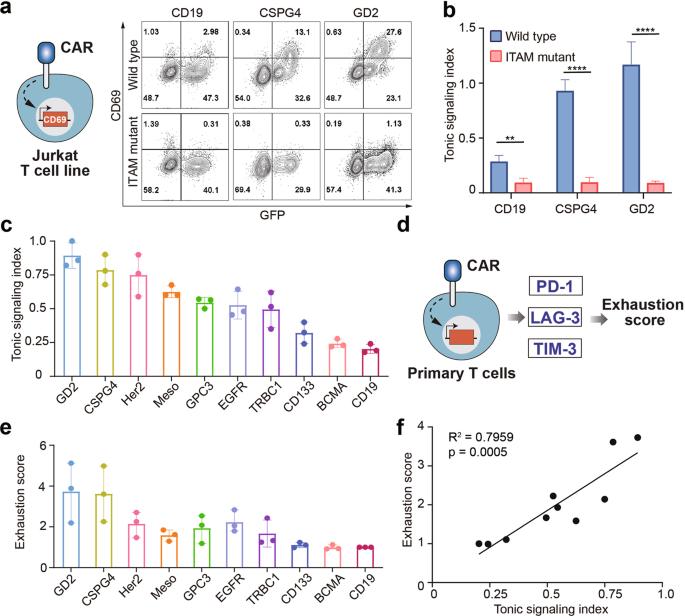Tuning charge density of chimeric antigen receptor optimizes tonic signaling and CAR-T cell fitness
IF 28.1
1区 生物学
Q1 CELL BIOLOGY
引用次数: 15
Abstract
Tonic signaling of chimeric antigen receptor (CAR), i.e., the spontaneous CAR activation in the absence of tumor antigen stimulation, is considered to be a pivotal event controlling CAR-T efficacy. However, the molecular mechanism underlying the spontaneous CAR signals remains elusive. Here, we unveil that positively charged patches (PCPs) on the surface of the CAR antigen-binding domain mediate CAR clustering and result in CAR tonic signaling. For CARs with high tonic signaling (e.g., GD2.CAR and CSPG4.CAR), reducing PCPs on CARs or boosting ionic strength in the culture medium during ex vivo CAR-T cell expansion minimizes spontaneous CAR activation and alleviates CAR-T cell exhaustion. In contrast, introducing PCPs into the CAR with weak tonic signaling, such as CD19.CAR, results in improved in vivo persistence and superior antitumor function. These results demonstrate that CAR tonic signaling is induced and maintained by PCP-mediated CAR clustering. Notably, the mutations we generated to alter the PCPs maintain the antigen-binding affinity and specificity of the CAR. Therefore, our findings suggest that the rational tuning of PCPs to optimize tonic signaling and in vivo fitness of CAR-T cells is a promising design strategy for the next-generation CAR.

调节嵌合抗原受体的电荷密度可优化营养信号传递和 CAR-T 细胞的适应性
嵌合抗原受体(CAR)的音调信号,即在没有肿瘤抗原刺激的情况下自发激活 CAR,被认为是控制 CAR-T 疗效的关键事件。然而,CAR自发信号的分子机制仍然难以捉摸。在这里,我们揭示了CAR抗原结合域表面的正电荷斑块(PCPs)介导CAR集群并导致CAR强直信号。对于具有高强直性信号的CAR(如GD2.CAR和CSPG4.CAR),在体内外CAR-T细胞扩增过程中减少CAR上的PCPs或提高培养基中的离子强度可最大限度地减少CAR的自发激活并缓解CAR-T细胞衰竭。与此相反,将 PCPs 引入 CD19.CAR 等强直性信号较弱的 CAR 中,可提高体内持久性和卓越的抗肿瘤功能。这些结果表明,PCP介导的CAR集群诱导并维持了CAR的强直性信号。值得注意的是,我们为改变 PCPs 而产生的突变保持了 CAR 的抗原结合亲和力和特异性。因此,我们的研究结果表明,合理调整PCPs以优化CAR-T细胞的强直性信号传导和体内适应性是下一代CAR的一种很有前途的设计策略。
本文章由计算机程序翻译,如有差异,请以英文原文为准。
求助全文
约1分钟内获得全文
求助全文
来源期刊

Cell Research
生物-细胞生物学
CiteScore
53.90
自引率
0.70%
发文量
2420
审稿时长
2.3 months
期刊介绍:
Cell Research (CR) is an international journal published by Springer Nature in partnership with the Center for Excellence in Molecular Cell Science, Chinese Academy of Sciences (CAS). It focuses on publishing original research articles and reviews in various areas of life sciences, particularly those related to molecular and cell biology. The journal covers a broad range of topics including cell growth, differentiation, and apoptosis; signal transduction; stem cell biology and development; chromatin, epigenetics, and transcription; RNA biology; structural and molecular biology; cancer biology and metabolism; immunity and molecular pathogenesis; molecular and cellular neuroscience; plant molecular and cell biology; and omics, system biology, and synthetic biology. CR is recognized as China's best international journal in life sciences and is part of Springer Nature's prestigious family of Molecular Cell Biology journals.
 求助内容:
求助内容: 应助结果提醒方式:
应助结果提醒方式:


